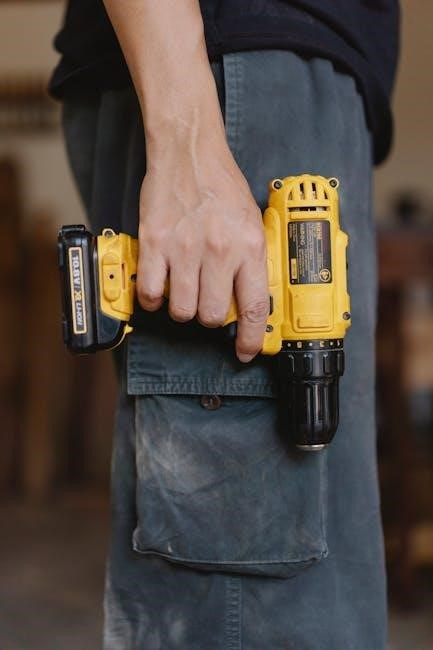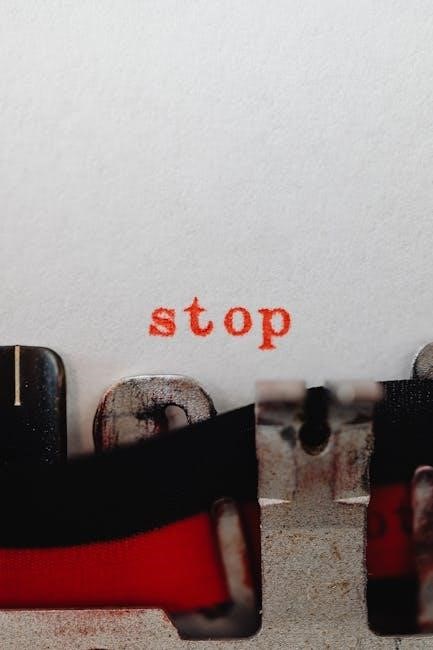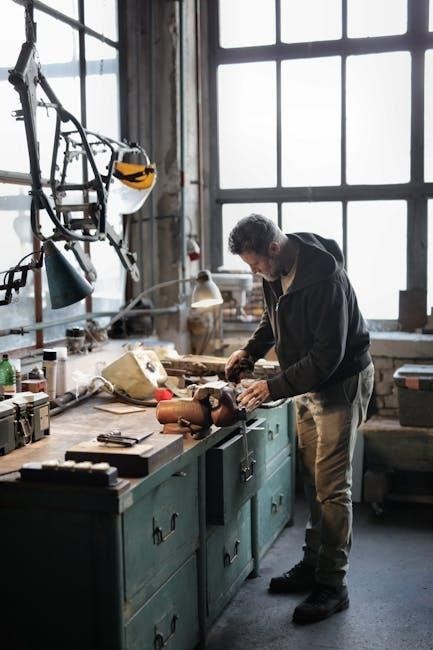The FDNY Probie Manual is a comprehensive guide designed to help new firefighters navigate their probationary period, ensuring they understand protocols, safety measures, and departmental expectations effectively.
Overview of the FDNY Probie Manual
The FDNY Probie Manual serves as a foundational guide for new firefighters, detailing essential training, procedures, and protocols. It covers critical topics such as safety measures, emergency response tactics, and departmental policies, ensuring probationary firefighters understand their roles and responsibilities. The manual is structured to provide clear, concise information, helping recruits navigate their probationary period effectively. It emphasizes the importance of adhering to FDNY standards, preparing for daily challenges, and maintaining professionalism in high-pressure situations. This resource is indispensable for new firefighters aiming to excel in their duties and integrate seamlessly into the FDNY team.
Importance of the Probie Manual for New Firefighters
The Probie Manual is vital for new FDNY firefighters, providing a roadmap for success during their probationary period. It outlines critical procedures, safety protocols, and ethical standards, ensuring recruits are well-prepared for emergencies. By following the manual, probationary firefighters can reduce errors, enhance their performance, and build confidence. The manual also fosters a culture of safety and professionalism, helping new members understand their role within the FDNY. Its guidance is essential for navigating the challenges of firefighting, making it a cornerstone of their training and development.
Structure and Content of the Probie Manual
The FDNY Probie Manual is a comprehensive guide detailing critical procedures, safety protocols, and ethical standards. It includes key chapters on protocols, safety procedures, and daily responsibilities, ensuring recruits understand expectations and perform duties effectively.
Key Chapters and Sections
The FDNY Probie Manual includes essential chapters like Scene Size-Up and Search Strategies, detailing how to assess emergency situations and prioritize searches. Another critical section is Primary Search and Rescue Operations, outlining procedures for locating and evacuating individuals. Additionally, chapters on Personal Protective Equipment (PPE) Guidelines and Fireground Tactics and Communication ensure recruits understand safety protocols and effective communication during emergencies. These sections are vital for preparing probationary firefighters to handle real-world scenarios safely and efficiently, ensuring they meet FDNY standards and perform their duties effectively.
Most Important Chapters for New Recruits
The FDNY Probie Manual emphasizes chapters on Understanding FDNY Policies and Procedures, which outlines departmental rules and ethical conduct. Another vital section is Basic Life Support (BLS) Training, providing essential medical response skills. Additionally, Community Fire Safety Education highlights the importance of public outreach and fire prevention strategies. These chapters are fundamental for new recruits to grasp the fundamentals of firefighting, medical emergencies, and community interaction, ensuring they are well-prepared to serve effectively and safely in their roles.

The Recruitment and Hiring Process
The FDNY Recruitment and Hiring Process is rigorous, ensuring candidates meet strict qualifications to become firefighters. It outlines steps from application to final selection, preparing aspirants for the role.
FDNY Recruitment Call Center Contact Information
The FDNY Recruitment Call Center is a vital resource for candidates seeking information about the hiring process. The contact number, (718) 559-1100, provides direct access to recruitment staff who can answer questions, clarify eligibility criteria, and guide applicants through each step. Prospective firefighters are encouraged to save this number to ensure they stay informed about updates, testing dates, and other critical notifications. The call center is a key point of contact for navigating the recruitment process successfully.
Steps to Become an FDNY Firefighter
Becoming an FDNY firefighter involves several rigorous steps. First, candidates must meet basic qualifications, including age, residency, and educational requirements. They must then pass the FDNY written exam, which assesses knowledge and cognitive abilities. Next, candidates undergo physical performance tests to evaluate their strength and endurance. A thorough background investigation and medical evaluation follow. Finally, selected candidates attend the FDNY Fire Academy for training. The process is highly competitive, and staying informed through the FDNY Recruitment Call Center is crucial for success. Persistence and preparation are key to navigating this challenging process effectively.
Training and Probationary Period
The FDNY probationary period combines rigorous training with on-the-job experience, equipping new firefighters with essential skills and knowledge to excel in their roles effectively and safely.
The Probie Training Program
The Probie Training Program is a comprehensive and intensive curriculum designed to equip new firefighters with the skills and knowledge necessary for success. It combines classroom instruction with hands-on field training, covering essential topics such as firefighting techniques, emergency medical procedures, and safety protocols. The program emphasizes practical experience, ensuring probies can apply their training in real-world scenarios. Additionally, it fosters physical and mental preparedness, as well as teamwork and communication skills. This structured approach helps probationary firefighters transition seamlessly into their roles, ready to serve effectively and safely.
Challenges Faced by Probationary Firefighters
Probationary firefighters face numerous challenges, including intense physical demands, high-stress emergency situations, and the need to quickly master complex procedures. They must adapt to a demanding schedule, balancing training with operational duties. The steep learning curve, coupled with the pressure to perform flawlessly, can lead to mental and emotional strain. Additionally, probies often take on additional duties within the firehouse, such as cleaning and maintenance, which can be exhausting. Despite these hurdles, the support of experienced firefighters and rigorous training helps probationary members build resilience and excel in their roles.

Daily Life as an FDNY Probie
Daily life as an FDNY probie involves rigorous training, emergency responses, and firehouse duties such as cleaning, cooking, and equipment maintenance, preparing them for the demands of firefighting.
Typical Day-to-Day Responsibilities
A probie’s daily life is filled with intensive training, emergency response drills, and firehouse maintenance. Responsibilities include participating in simulated fire scenarios, practicing rescue techniques, and mastering equipment use. Firehouse chores like cleaning, cooking, and organizing living quarters are also part of the routine. Probies must stay alert for emergencies, ready to respond at a moment’s notice. Additionally, they are expected to review manuals, attend lectures, and engage in physical fitness activities to build stamina and teamwork. These tasks prepare them for the challenges of firefighting and integration into the FDNY team.
Physical and Mental Demands of the Job
Firefighting is a physically and mentally demanding profession, requiring probies to maintain peak fitness and emotional resilience. The job involves lifting heavy equipment, working in extreme temperatures, and enduring prolonged physical exertion. Mentally, probies must stay calm under pressure, make quick decisions, and cope with traumatic situations. The probationary period intensifies these challenges, as new recruits adapt to high-stress environments and rigorous training. Building both physical stamina and mental fortitude is essential for success. The FDNY provides resources, such as counseling and fitness programs, to support probies in managing these demands and performing effectively.

Firefighting Procedures and Protocols
Firefighting procedures and protocols are standardized methods and rules guiding emergency response and tactical operations. They ensure safety, efficiency, and compliance with regulations, crucial for probies to master.
Scene Size-Up and Search Strategies
Scene size-up involves quickly assessing the situation to identify hazards, determine the extent of the emergency, and prioritize actions. This step is critical for ensuring safety and effective response. Probies learn to evaluate factors like building type, visible fire or smoke conditions, and potential occupant locations. Effective search strategies, such as primary and secondary searches, are taught to locate and rescue individuals efficiently. These protocols emphasize systematic approaches to minimize risks and maximize rescue outcomes, ensuring firefighters operate with precision and clarity in high-pressure situations.
Primary Search and Rescue Operations
Primary search and rescue operations focus on rapidly locating and evacuating individuals from dangerous environments, often before or during firefighting efforts. Probies are trained to conduct thorough, systematic searches, prioritizing life safety. This involves checking all accessible areas, using thermal imaging cameras to detect heat sources, and communicating findings clearly. The goal is to ensure no one is left behind while maintaining firefighter safety. These operations require precision, quick decision-making, and adherence to FDNY protocols to maximize rescue effectiveness and minimize risks in emergency situations.

Safety and Equipment Maintenance
The FDNY Probie Manual emphasizes critical safety practices, including regular inspections and maintenance of firefighting equipment to ensure operational reliability and minimize risks, adhering to FDNY standards.
Personal Protective Equipment (PPE) Guidelines
The FDNY Probie Manual outlines strict Personal Protective Equipment (PPE) guidelines to ensure firefighter safety. PPE includes helmets, coats, pants, boots, gloves, and Self-Contained Breathing Apparatus (SCBA). Proper fitting and maintenance are emphasized to prevent equipment failure. Firefighters must inspect PPE daily for damage or wear and tear. Adherence to NFPA standards is mandatory. The manual also highlights the importance of donning and doffing PPE correctly to minimize exposure risks. Regular training drills reinforce PPE usage and care, ensuring compliance and operational readiness during emergencies.
Proper Use and Maintenance of Firefighting Gear
Proper use and maintenance of firefighting gear are critical for safety and effectiveness. The FDNY Probie Manual emphasizes daily inspections of equipment, such as helmets, coats, and SCBAs, to ensure functionality. Cleaning and storing gear in a dry, cool environment prevents damage and mold growth. Firefighters must adhere to NFPA standards for equipment care. Regular maintenance, including checks for worn or damaged parts, is mandatory. Proper storage and organization of gear in the firehouse or truck ensure quick access during emergencies. Annual professional inspections are also required to certify equipment readiness.
Fireground Tactics and Communication
Fireground tactics and communication are essential for coordinated responses. Clear radio protocols ensure command clarity, while situational awareness drives dynamic decision-making, enhancing team safety and operational success.
Communication Protocols During Emergencies
Effective communication is critical during emergencies. The FDNY Probie Manual emphasizes clear radio protocols to ensure commands are understood. Firefighters must use predefined terminology and follow incident command systems. Mayday procedures are detailed for distress situations, ensuring rapid response. Proper communication minimizes confusion, enhancing team coordination and safety. Adhering to these protocols is vital for operational success and protecting both civilians and firefighters. Radio discipline, such as avoiding unnecessary chatter, is stressed to maintain clear lines of communication. These practices are essential for managing dynamic emergency scenarios effectively.
Understanding Incident Command Systems
The FDNY Probie Manual outlines the Incident Command System (ICS), a standardized framework for managing emergency responses. ICS ensures clear chain of command, role delegation, and effective coordination among units. Probies learn to identify command roles, such as Incident Commander and Safety Officer, and understand their responsibilities. This system enhances communication, reduces confusion, and prioritizes safety. Familiarity with ICS is crucial for new firefighters to operate efficiently and ensure seamless teamwork during complex operations, maintaining order and accountability in high-pressure situations.

Physical Fitness and Nutrition
The FDNY Probie Manual emphasizes physical fitness and proper nutrition as essential for peak performance, detailing exercise routines and dietary advice to support energy and recovery.
Physical Fitness Requirements for Firefighters
Fulfilling the physical demands of firefighting requires rigorous fitness. Probies must build endurance, strength, and agility through regular exercise. The FDNY mandates passing the Candidate Physical Ability Test (CPAT), which assesses stamina, power, and dexterity. Daily responsibilities, like carrying heavy equipment and working in extreme conditions, demand peak physical conditioning. A structured workout plan, including cardio, weight training, and flexibility exercises, is essential. Proper nutrition and hydration further support energy levels and recovery, ensuring probies can perform effectively in high-stress situations while maintaining overall health and resilience.
Nutrition Tips for Optimal Performance
Proper nutrition is vital for firefighters to maintain energy and endurance. A balanced diet rich in lean proteins, complex carbohydrates, and healthy fats supports physical performance. Staying hydrated is crucial, especially during intense training and operations. Meals should be timed to fuel workouts and recovery, avoiding heavy eating before physical exertion. Probies should focus on whole foods, limit fast food, and avoid sugary snacks. Incorporating nutrient-dense options like fruits, vegetables, and whole grains ensures sustained energy levels. A well-planned diet helps probies meet the demands of their role effectively while promoting overall health and resilience.

Legal and Ethical Considerations
The FDNY Probie Manual emphasizes adherence to legal responsibilities, ethical standards, and departmental policies. Firefighters must uphold integrity, respect confidentiality, and report misconduct to maintain public trust and accountability.
Understanding FDNY Policies and Procedures
Understanding FDNY policies and procedures is crucial for probationary firefighters. The manual outlines expectations for conduct, safety protocols, and operational guidelines. It covers reporting procedures, disciplinary actions, and ethical behavior, ensuring accountability and transparency. Firefighters must familiarize themselves with these policies to maintain professionalism and uphold department standards. Adherence to these guidelines is essential for safe and effective operations, fostering trust within the team and the community they serve. Clear understanding of these protocols helps probationary firefighters navigate their roles confidently and responsibly.
Ethical Behavior and Professional Conduct
Ethical behavior and professional conduct are cornerstone values for FDNY probationary firefighters. The manual emphasizes honesty, integrity, and respect for confidentiality in all interactions. Firefighters must adhere to departmental policies, avoiding actions that could compromise public trust. Maintaining a professional demeanor, both on and off duty, is essential to uphold the FDNY’s reputation. Understanding ethical guidelines ensures probationary firefighters act responsibly and respectfully, fostering a culture of accountability and teamwork. Adherence to these standards is vital for building trust within the department and the communities they serve.

Emergency Medical Procedures
The FDNY Probie Manual outlines critical emergency medical procedures, including Basic Life Support (BLS) techniques, patient assessment, and trauma care, essential for probationary firefighters to master.
Basic Life Support (BLS) Training
Basic Life Support (BLS) training is a fundamental component of the FDNY Probie Manual, equipping firefighters with critical skills in emergency medical care. This training includes CPR techniques, AED use, and airway management, ensuring immediate response to life-threatening situations. Probies learn to assess patients, manage breathing, and restore circulation effectively. Practical sessions and simulations prepare them for real-world scenarios, emphasizing quick decision-making and adherence to protocols. Mastery of BLS is essential for providing timely, lifesaving interventions, aligning with FDNY’s commitment to public safety and emergency medical excellence.
Emergency Medical Response Protocols
Emergency Medical Response Protocols in the FDNY Probie Manual outline standardized procedures for firefighters to deliver immediate care in medical emergencies. These protocols include patient assessment, injury stabilization, and life-saving interventions. Probies are trained to prioritize care, manage trauma, and administer basic medical aid until advanced life support arrives. Adherence to these protocols ensures timely and effective response, minimizing complications and improving patient outcomes. The manual emphasizes coordination with EMS and hospital teams, ensuring a seamless transition of care. Mastery of these protocols is crucial forprobies to perform confidently in high-pressure situations, safeguarding public health and safety.
Fire Prevention and Education
The FDNY Probie Manual emphasizes fire prevention through community education, inspections, and public outreach, equipping firefighters with strategies to prevent fires and promote safety awareness.
Community Fire Safety Education
The FDNY Probie Manual highlights the importance of community fire safety education, emphasizing strategies to prevent fires through public outreach. Probies learn to conduct fire safety seminars, distribute educational materials, and engage in school programs to teach fire prevention. These efforts focus on reducing fire hazards, promoting smoke detector installation, and encouraging families to create escape plans. By educating the public, firefighters play a crucial role in building safer communities and preventing emergencies before they occur.
Fire Prevention Strategies and Inspections
The FDNY Probie Manual outlines fire prevention strategies, including regular inspections of buildings, businesses, and residential areas to identify potential hazards. Probies are trained to enforce fire codes, check fire extinguishers, and ensure proper exit access. These inspections aim to prevent fires by addressing risks proactively. Additionally, the manual emphasizes the importance of follow-up visits to ensure compliance, fostering a safer environment for communities. These strategies are vital for reducing fire incidents and protecting public safety.

Mental Health and Wellness
The FDNY Probie Manual emphasizes managing stress, building resilience, and accessing mental health resources to support firefighters’ well-being during their demanding probationary period.
Stress Management for Firefighters
Stress management is crucial for firefighters due to the high-pressure nature of their job. Techniques like mindfulness, exercise, and seeking support from peers or professionals can help mitigate stress. The FDNY Probie Manual highlights the importance of mental well-being and provides resources to manage stress effectively, ensuring firefighters can perform their duties safely and efficiently. Regular check-ins and stress reduction programs are also recommended to maintain mental health throughout their career.
Available Mental Health Resources
The FDNY Probie Manual emphasizes the importance of mental health, offering access to counseling services, peer support groups, and confidential hotlines. Firefighters can connect with mental health professionals through the FDNY’s Employee Assistance Program (EAP), which provides free, confidential counseling. Additionally, resources like the FDNY Counseling Services Unit and external mental health organizations are available to support firefighters in managing stress and trauma. These resources ensure that probationary firefighters have access to the help they need to maintain their mental well-being throughout their career.
Graduation and Beyond
Graduation marks the end of probation, transitioning probationary firefighters into official FDNY firefighters. It signifies their readiness for active duty, further training, and career advancement opportunities.
Completing the Probationary Period
Completing the probationary period is a significant milestone for FDNY probationary firefighters. It requires demonstrating mastery of firefighting skills, understanding department protocols, and showing dedication to the role. Probies must pass rigorous evaluations, including physical assessments, written exams, and practical simulations. Successful completion marks their transition from trainees to official firefighters, ready to serve actively. The process ensures only the most capable and prepared individuals move forward, upholding FDNY’s high standards of excellence and public safety.
Continuing Education and Career Advancement
Continuing education is vital for FDNY probationary firefighters to advance their careers. After completing the probationary period, firefighters can pursue specialized certifications, such as Emergency Medical Technician (EMT) or Fire Instructor. The FDNY offers advanced training programs, including leadership development and hazardous materials operations; Career advancement opportunities include promotions to lieutenant, captain, and higher ranks, requiring successful completion of civil service exams. Staying updated on the latest firefighting techniques and technologies ensures long-term success and prepares firefighters for leadership roles within the department.

Additional Resources
The FDNY Probie Manual recommends supplementary reading materials and online training resources to enhance knowledge and skills; These resources include firefighter training guides and department-approved websites.
Recommended Reading for Probies
The FDNY Probie Manual suggests several essential books and guides to aid probationary firefighters in their training and preparation. These resources include manuals on fireground tactics, emergency medical procedures, and fire safety protocols. Additionally, online platforms like FDNY’s official website and firefighter training forums provide updated materials and tips. Probies are encouraged to use search engines effectively to find these resources by using specific keywords or filters, ensuring they access the most relevant and current information to enhance their skills and understanding of firefighting operations.
Online Resources for Firefighter Training
Probies can access numerous online resources to enhance their training, including the FDNY’s official website, which offers detailed guides and updates. Reputable platforms like FireEngineering and NFPA provide instructional materials and courses. Additionally, forums and communities dedicated to firefighter training share real-world insights and tips. Utilizing search engines with specific keywords or filters helps locate the most relevant and up-to-date information, ensuring probies can efficiently find resources tailored to their needs and stay informed about the latest techniques and protocols in firefighting.